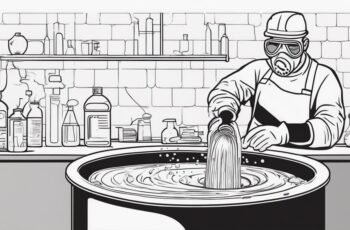If the persistent stench from your septic tank is like a constant shadow, lurking around your home, you know the frustration it brings. But fear not, as there are effective ways to banish that unpleasant odor for good.
By uncovering the underlying causes and implementing targeted solutions, you can transform your environment into a fresh and welcoming space.
Stay tuned to discover the ultimate guide that will help you bid farewell to septic tank smells once and for all.
Key Takeaways
- Regular maintenance, inspections, and pumping every 3-5 years prevent septic tank odors.
- Proper ventilation, septic-safe products, and healthy bacteria reduce odor production.
- Avoid flushing non-biodegradable items or chemicals to maintain a fresh septic system.
- Implement prevention strategies to ensure an odor-free environment in the long term.
Understanding Septic Tank Odors

To understand septic tank odors, you must grasp the processes that lead to the generation of these unpleasant smells. Odor sources in septic tanks primarily stem from the decomposition of organic matter by bacteria. As these bacteria break down waste, they produce gases such as hydrogen sulfide, ammonia, and methane, which contribute to the foul odors emanating from the tank. Additionally, a lack of proper ventilation can trap these gases, intensifying the smell.
Prevention tips to combat septic tank odors include regular maintenance and inspections. Pumping your septic tank every 3-5 years, depending on household size, can prevent the buildup of solid waste that leads to odor issues. Ensuring proper ventilation and avoiding flushing non-biodegradable items down the drain are also crucial steps. Furthermore, using septic-safe products and implementing a healthy bacterial population in the tank can aid in breaking down waste efficiently, reducing odor production. By following these prevention tips, you can effectively manage and eliminate septic tank smells.
Identifying the Root Cause
Identifying the root cause of septic tank odors involves pinpointing the specific factors contributing to the foul smells emanating from the system. Conducting a root cause analysis is crucial in determining why the odors are present.
Common reasons for septic tank odors include a lack of proper ventilation, leaks or cracks in the tank, blockages in the pipes, or a full tank that needs pumping. To prevent these odors from recurring, implementing prevention strategies is essential.
Ensure regular maintenance checks are carried out to catch any issues early on. Properly sealing any cracks or leaks and ensuring the tank is adequately ventilated can go a long way in preventing odors. Additionally, being mindful of what goes into the septic system, such as avoiding flushing non-biodegradable items or chemicals, can help maintain a healthy system and minimize odors.
Effective Odor Control Methods

When addressing septic tank odors, employing effective odor control methods is essential to maintain a healthy and odor-free system. Odor neutralizers are a powerful tool in combating unpleasant smells emanating from septic tanks. These products work by chemically altering the odor compounds, neutralizing them and reducing their potency. By using odor neutralizers specifically designed for septic systems, you can effectively tackle the source of the smell, ensuring a fresher environment.
Another option for controlling septic tank odors is the use of scented additives. These additives not only help mask any existing odors but also leave behind a pleasant fragrance. When choosing scented additives, opt for those formulated for septic tanks to prevent interference with the system's natural processes. Regularly adding these scented products can provide ongoing odor control and create a more enjoyable atmosphere around your septic system.
Maintaining a Odor-Free System
Maintain an odor-free septic system by implementing regular maintenance practices and utilizing effective odor control methods. To keep your system running smoothly and odor-free, follow these essential tips:
- Schedule Regular Pumping: Regularly pumping your septic tank is crucial to prevent backups and ensure proper functioning. Aim to have your tank pumped every 3-5 years, depending on the size of your household and usage.
- Practice Water Conservation: Excessive water usage can overload your septic system, leading to odors and potential backups. Be mindful of water usage by fixing leaks promptly, installing water-efficient fixtures, and spreading out laundry loads.
- Avoid Flushing Harmful Substances: To maintain an odor-free system, avoid flushing harmful substances like grease, oils, chemicals, and non-biodegradable items down the drain. These can disrupt the balance of bacteria in your septic tank, causing odors and clogs.
Conclusion
By following the ultimate guide to eliminating septic tank smell, you can ensure your system remains odor-free for years to come.
Just like tending to a garden to keep it blooming, regular maintenance and effective odor control methods are key to maintaining a pleasant environment in your home.
With these tools and techniques in hand, you can enjoy a fresh and clean septic system without the worry of unpleasant odors lingering around.

